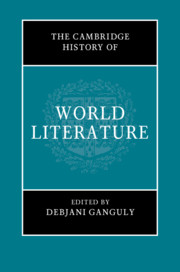Book contents
- The Cambridge History of World Literature
- The Cambridge History of World Literature
- Copyright page
- Contents
- Figures
- Contributors
- Acknowledgements
- Introduction
- Part I Genealogies
- Part II Thinking the World
- Part III Transregional Worlding
- Part IV Cartographic Shifts
- Part V World Literature and Translation
- Part VI Poetics, Genre, Intermediality
- Part VII Scales, Polysystems, Canons
- Part VIII Modes of Reading and Circulation
- Part IX The Worldly and the Planetary
- 44 Asylum Papers
- 45 Guantánamo Diary as World(ly) Testimony
- 46 The Nonhuman, the Posthuman, and the Universal
- 47 World Literature as Planetary Literature
- Index
- References
47 - World Literature as Planetary Literature
from Part IX - The Worldly and the Planetary
Published online by Cambridge University Press: 17 August 2021
- The Cambridge History of World Literature
- The Cambridge History of World Literature
- Copyright page
- Contents
- Figures
- Contributors
- Acknowledgements
- Introduction
- Part I Genealogies
- Part II Thinking the World
- Part III Transregional Worlding
- Part IV Cartographic Shifts
- Part V World Literature and Translation
- Part VI Poetics, Genre, Intermediality
- Part VII Scales, Polysystems, Canons
- Part VIII Modes of Reading and Circulation
- Part IX The Worldly and the Planetary
- 44 Asylum Papers
- 45 Guantánamo Diary as World(ly) Testimony
- 46 The Nonhuman, the Posthuman, and the Universal
- 47 World Literature as Planetary Literature
- Index
- References
Summary
This essay argues for the distinctiveness of the call to the planetary in its twenty first century form, without discounting its historical antecedents. It considers nodes of a distinctive necropolitics related increasingly to climate change, which break with the world-now of 1989 and its aftermaths in contemporary theories of world literature. Issues of death and its contemporary modes are worked with, alongside figurations of water and plant life. The essay is cautious yet insistent that we enable a conversation about planetary form as literary form in thinking about world literature.
- Type
- Chapter
- Information
- The Cambridge History of World Literature , pp. 924 - 941Publisher: Cambridge University PressPrint publication year: 2021



